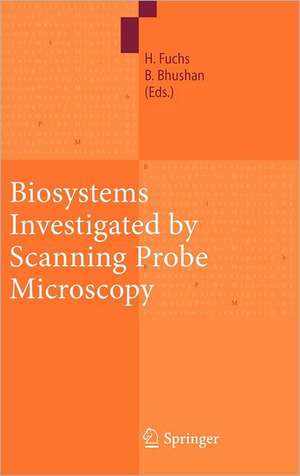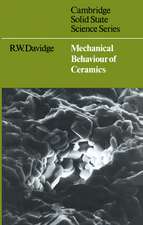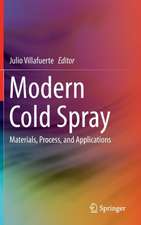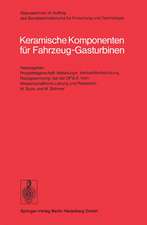Biosystems - Investigated by Scanning Probe Microscopy
Editat de Harald Fuchs, Bharat Bhushanen Limba Engleză Hardback – 26 feb 2010
For scientists and professionals in academic and industry dealing with surface analytics of plant science, living cells, nanomedicine, cosmetics and biomimetics.
| Toate formatele și edițiile | Preț | Express |
|---|---|---|
| Paperback (1) | 1243.78 lei 6-8 săpt. | |
| Springer Berlin, Heidelberg – 23 aug 2016 | 1243.78 lei 6-8 săpt. | |
| Hardback (1) | 1249.63 lei 6-8 săpt. | |
| Springer Berlin, Heidelberg – 26 feb 2010 | 1249.63 lei 6-8 săpt. |
Preț: 1249.63 lei
Preț vechi: 1523.93 lei
-18% Nou
Puncte Express: 1874
Preț estimativ în valută:
239.12€ • 255.70$ • 199.37£
239.12€ • 255.70$ • 199.37£
Carte tipărită la comandă
Livrare economică 17 aprilie-01 mai
Preluare comenzi: 021 569.72.76
Specificații
ISBN-13: 9783642024047
ISBN-10: 3642024041
Pagini: 868
Ilustrații: XXVI, 841 p.
Dimensiuni: 155 x 235 x 51 mm
Greutate: 1.36 kg
Ediția:2010
Editura: Springer Berlin, Heidelberg
Colecția Springer
Locul publicării:Berlin, Heidelberg, Germany
ISBN-10: 3642024041
Pagini: 868
Ilustrații: XXVI, 841 p.
Dimensiuni: 155 x 235 x 51 mm
Greutate: 1.36 kg
Ediția:2010
Editura: Springer Berlin, Heidelberg
Colecția Springer
Locul publicării:Berlin, Heidelberg, Germany
Public țintă
Professional/practitionerCuprins
Instrumentation and Methods.- Scanning ProbeMicroscopy in Biological Research.- Scanning Probes for the Life Sciences.- New AFM Developments to Study Elasticity and Adhesion at the Nanoscale.- Application of SPM and Related Techniques to the Mechanical Properties of Biotool Materials.- Direct Force Measurements of Receptor#x2013;Ligand Interactions on Living Cells.- Self-Sensing Cantilever Sensor for Bioscience.- Microfabricated Cantilever Array Sensors for (Bio-)Chemical Detection.- Nanomechanics and Microfluidics as a Tool for Unraveling Blood Clotting Disease.- Quantitative Nanomechanical Measurements in Biology.- Applications of Scanning Near-Field Optical Microscopy in Life Science.- Scanning Ion Conductance Microscopy.- Scanning Probe Lithography for Chemical, Biological and Engineering Applications.- Scanning Probe Microscopy: From Living Cells to the Subatomic Range.- AFM of Biomolecules.- Atomic Force Microscopy of DNA Structure and Interactions.- Nanostructuration and Nanoimaging of Biomolecules for Biosensors.- AFM of Biological Membranes, Cells and Tissue.- Imaging Chemical Groups and Molecular Recognition Sites on Live Cells Using AFM.- Single-Molecule Studies on Cells and Membranes Using the Atomic Force Microscope.- Atomic Force Microscopy: Interaction Forces Measured in Phospholipid Monolayers, Bilayers, and Cell Membranes.- Atomic Force Microscopy Studies of the Mechanical Properties of Living Cells.- Application of Atomic Force Microscopy to the Study of Expressed Molecules in or on a Single Living Cell.- Towards a Nanoscale View of Microbial Surfaces Using the Atomic Force Microscope.- Cellular Physiology of Epithelium and Endothelium.- Nanotribological Characterization of Human Hair and Skin Using Atomic Force Microscopy (AFM).- Evaluating Tribological Properties of Materials for Total Joint Replacements Using Scanning Probe Microscopy.- Atomic Force Microscopy in Nanomedicine.- Functional Bio(-inspired) Surfaces.- Lotus Effect: Roughness-Induced Superhydrophobicity.- Gecko Feet: Natural Attachment Systems for Smart Adhesion#x2014;Mechanism, Modeling, and Development of Bio-Inspired Materials.
Recenzii
From the reviews:
“This book is a compilation of 27 contributions representative of the scanning-probe microscopy techniques … . The volume is organized in four topical parts. … can be very useful in a laboratory to introduce students to their first steps in AFM, and to provide more experienced researchers with the state-of- the-art of AFM-based methodology presented by outstanding scientists.” (Bruno Samorì and Francesco Valle, Analytical and Bioanalytical Chemistry, Vol. 399, 2011)
“This book is a compilation of 27 contributions representative of the scanning-probe microscopy techniques … . The volume is organized in four topical parts. … can be very useful in a laboratory to introduce students to their first steps in AFM, and to provide more experienced researchers with the state-of- the-art of AFM-based methodology presented by outstanding scientists.” (Bruno Samorì and Francesco Valle, Analytical and Bioanalytical Chemistry, Vol. 399, 2011)
Caracteristici
Comprehensive overview of the topic Selection of the contributions made by the editors Handy and easy-to-use combination in one volume Includes supplementary material: sn.pub/extras









